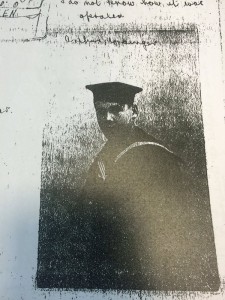Maud Clarke (b. 1887): War and Memory
Maud’s memoir ‘Untitled’ was written in 1978, long after the conclusion of the World Wars. Yet whilst she evidently lived through both of them, and more than likely had her life affected by these travesties, there is a distinct lack of detail regarding either of the wars. In fact, the only mention of the wars was the pictures she included from family photo albums of her relatives preparing to fight. They include her brother-in-law, who she does not mention by name, although from family records we can confidently assume his name was Franks, married to her sister Dora, and also her cousin, Arthur Grainger, a young man who does not look a day over twenty. It is important to remember that memory is selective, and Maud’s memoir only shows the parts of her life that she wants to show, therefore there is a possibility that there were other memories that she did not feel comfortable in writing down that may have related to the wars.
Yet other memories she shares with us notably resonate with trauma, and this is one way of bringing out the memories that often prove too upsetting to remember. One particular memory that stood out to me was how she told us about the death of her six-year old daughter. This memory, although not spoken about in much detail, was clearly brought out by her own Mother’s devastation of losing a child, which she remembers ever so clearly;
Eight months later I was again awakened by Mother’s cry of anguish; ‘my child, my child,’ as she witnessed the death of this loved baby. Again I suffered 28 years after when my six year old daughter died. (Clarke, p. 26)

Unlike many autobiographers, Maud does not use the pronoun ‘we’ when talking about herself and the people around her and instead favours writing her memoir in first person, which is brilliant as it makes her memoir so much more personal to the readers and it really made myself think and put myself in her perspective to try to understand some of the events that happened that made up her life. Everyone experiences trauma, yet I feel that it takes a particular amount of courage to write about it for public consumption, it highlights just how strong of a person you can be.
She also remembers the wonderful events of her childhood, including the letter from Queen
Who’s to look after the kids?
From being part of various charities that help children, this was a really special part of the memoir, that signifies a community coming together for complete strangers who were risking their lives for their country. It symbolises some of the selfless behaviour that at present we so desperately need, and from Maud’s perspective of being a teacher, I would assume that this letter was important to her too, for the well-being of the war children.
Works Cited:
- Clarke, Maud. ‘Untitled.’ pp.67, Brunel University Library. (1978)
- Gagnier, Regenia. ‘Working-Class Autobiography, Subjectivity, and Gender.’ Victorian Studies 30.3 (1987): 335-363
- Gomersall, Meg. Working-Class Girls in Nineteenth-Century England: Life, Work and Schooling. Basingstoke: Macmillan, 1997.
- Rose, Jonathan, ‘Rereading the English Common Reader: A Preface to a History of Audiences.’ Journal of the History of Ideas. 53. 1 (1992): 47-70.
Images Cited:
- [1] Clarke, Maud. ‘Untitled.’ pp.67, Brunel University Library, 1978 (p. 31)
- [2] http://www.bbctransgenerational.com/gallery.html

Leave a Reply